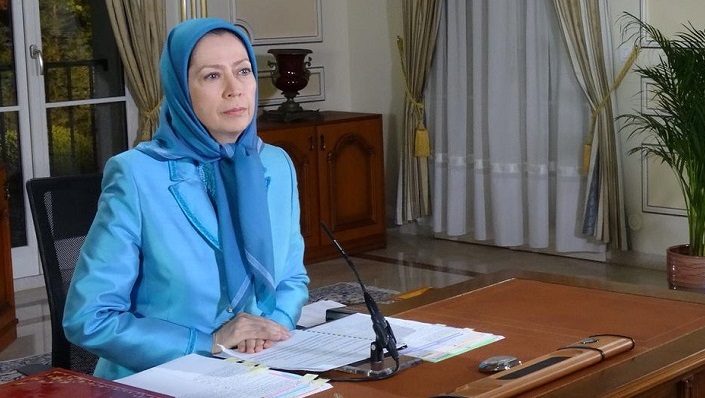
Maryam Rajavi, leader of the Iranian opposition, testifying before the US Congress via video conference
The House Foreign Affairs Committee’s Subcommittee on Terrorism, Nonproliferation and Trade held a hearing on Capitol Hill on the rise and threat posed by ISIS. That in and of itself is not earthshattering news since elected officials have debated heatedly how to address the growing pandemic that is extremist Islamic groups such as ISIS, Boko Haram and the Houthis.
hat was significant was the witness list of speakers because on it was Mrs. Maryam Rajavi, the president-elect of the National Council of Resistance of Iran, a leading Iranian dissident group, who made an appearance via videoconference. It was an important appearance because it represented a key opportunity for the strongest voice of the largest grassroots dissident group to the regime to address Congress on the links between ISIS and Iran.
As Rep. Brad Sherman (D-CA) noted in his comments, the NCRI has proven instrumental in the past in revealing secrets the Iran regime has sought to keep hidden from the outside world such as the secret Natanz nuclear research facility.
Mrs. Rajavi was given the opportunity by the subcommittee because NCRI members have been on the ground in Iran and Iraq having vast knowledge of the situation as the main opposition to the regime in Iran and given the role of the Iranian regime in all crisis in the region. Because there are literally hundreds of thousands of people displaced or brutalized by ISIS and militia forces controlled and directed by Iran’s mullahs, the NCRI has shown itself to be very knowledgeable regarding the regime’s activities in the region.
In her comments to the subcommittee, Mrs. Rajavi explained the origins of ISIS, such as the funding and training of ISIS leader Abu Bakr al-Baghdadi in Iran, including even a doctorate degree in Islamic jurisprudence from Baghdad Islamic University, along with Iranian support for other key ISIS founders who arose out of the war fought against U.S. and coalition forces during the invasion of Iraq and the sectarian civil war in Syria that Iran was backing.
Mrs. Rajavi dubbed the Iran regime as the “godfather” of the Islamic State militant group and noted that “the ultimate solution to this problem is regime change.”
She went on to explain the core issue linking the Iran regime and the Islamic State was the perpetuation of violent and extremist Islamic teachings which provided a template of terror, brutality and abuse for terror groups to follow.
And in a clear warning to Representatives in attendance, she urged caution in approving any nuclear deal that rewarded Iran with economic relief without concrete proof of dismantling of its nuclear program.
“None of the sanctions should be lifted before an agreement has been signed that effectively and definitively denies the mullahs the bomb,” Mrs. Rajavi said. “Otherwise, the regime will spend billions of unfrozen assets to buy weapons, including advanced missiles from Russia.”
Rep. Sheila Jackson Lee (D-TX) praised Ms. Rajavi’s appearance as well and called the session “a historic hearing,” notable for bringing Iran’s opposition into official discourse.
That, more than anything else, was what the Iran regime’s lobbying and PR machine feared the most. The idea that a moderate, Muslim woman, leading a group of dissidents to Iran’s mullahs, would actually be able to speak before the greatest legislative body in the world and tell simply and matter-of-factly of the horrors and abuses being visited on thousands of her fellow Iranian citizens.
It is even more laughable when you hear of some of the complaints voiced by these regime apologists who apply one standard to the NCRI in denouncing it, yet in another breath argue for open and honest dialogue and trust with the Iran regime that has a three decade history of kidnapping, targeting, attacking and killing thousands of American military and civilian personnel in places such as Lebanon, Afghanistan, Syria, Iraq and elsewhere.
The fact that Mrs. Rajavi was able to speak represents a small, but historic step in allowing the voices of those most oppressed to finally have a voice and a forum.
By Laura Carnahan